22 sept 2019
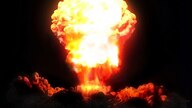
It was the first report of an alleged Israeli nuclear test; no smoking gun connecting Israel to the 1979 event nor confirmation by official sources given; Carter: 'There was indication of nuclear explosion—either South Africa, Israel or nothing'
A new report claims that the U.S. government was aware of an Israeli nuclear test conducted 40 years ago today.
On the 40th anniversary of this event, Foreign Policy Magazine has rounded up a team of scientists, academics, former government officials and nonproliferation experts to analyze data and documents that have declassified since then.
Shortly before the dawn of September 22nd, an American satellite called Vela6911 documented a double flash while orbiting over the southern Atlantic Ocean.
It was clear to the crew at the Patrick Air Force Base in Florida that this was a nuclear explosion, an occurrence that American satellites have already documented dozens of times before.
The U.S. Air Force issued an alert and President Carter rushed to call a meeting in the White House Situation Room the very next day.
The initial suspicion fell on South Africa's Apartheid regime, which was known to be working on a bomb, and even more so on Israel, which had close military ties with the South Africans.
It was the first report of an alleged Israeli nuclear test, though foreign publications had already reported that Israel possessed a nuclear arsenal.
Carter wrote in his journal on September 22: “There was indication of a nuclear explosion in the region of South Africa—either South Africa, Israel using a ship at sea, or nothing”.
An expert panel, appointed by the president’s science advisor, Frank Press, issued its final report in May 1980, after just three meetings. It concluded that "the September 22 signal was probably not from a nuclear explosion".
Its members dismissed all evidence that suggested otherwise. This included the Naval Research Laboratory’s analysis that had located the blast’s ground zero near the Prince Edward Islands, about 1,000 miles from South Africa’s southern coast, using hydroacoustic (underwater sound) data, and claims regarding possible detection of radioactive iodine-131 in thyroids of Australian sheep.
Foreign Policy didn't point to a single smoking gun connecting Israel to the event and no official source has ever publicly confirmed that Israel has carried out a nuclear test.
However, the researchers estimated, according to the available data, that the Vela event was a detection of a hydrogen bomb test.
Israeli nuclear program
During the 1973 Yom Kippur War, Israeli leaders and their nuclear advisors recognized that the country’s small nuclear arsenal was irrelevant to Israel's military situation.
That is why the Israel Atomic Energy Commission was carrying out a broad research and development program, with a focus on completing the mastery of two-stage thermonuclear weapons design.
It was in this period that Shimon Peres, the man who is credited with the birth of the Israeli nuclear program in the late 1950s, took the role of defense minister and supported that push.
A commitment to a two-stage design necessarily entails a need to test.
A high-level firing
A new report claims that the U.S. government was aware of an Israeli nuclear test conducted 40 years ago today.
On the 40th anniversary of this event, Foreign Policy Magazine has rounded up a team of scientists, academics, former government officials and nonproliferation experts to analyze data and documents that have declassified since then.
Shortly before the dawn of September 22nd, an American satellite called Vela6911 documented a double flash while orbiting over the southern Atlantic Ocean.
It was clear to the crew at the Patrick Air Force Base in Florida that this was a nuclear explosion, an occurrence that American satellites have already documented dozens of times before.
The U.S. Air Force issued an alert and President Carter rushed to call a meeting in the White House Situation Room the very next day.
The initial suspicion fell on South Africa's Apartheid regime, which was known to be working on a bomb, and even more so on Israel, which had close military ties with the South Africans.
It was the first report of an alleged Israeli nuclear test, though foreign publications had already reported that Israel possessed a nuclear arsenal.
Carter wrote in his journal on September 22: “There was indication of a nuclear explosion in the region of South Africa—either South Africa, Israel using a ship at sea, or nothing”.
An expert panel, appointed by the president’s science advisor, Frank Press, issued its final report in May 1980, after just three meetings. It concluded that "the September 22 signal was probably not from a nuclear explosion".
Its members dismissed all evidence that suggested otherwise. This included the Naval Research Laboratory’s analysis that had located the blast’s ground zero near the Prince Edward Islands, about 1,000 miles from South Africa’s southern coast, using hydroacoustic (underwater sound) data, and claims regarding possible detection of radioactive iodine-131 in thyroids of Australian sheep.
Foreign Policy didn't point to a single smoking gun connecting Israel to the event and no official source has ever publicly confirmed that Israel has carried out a nuclear test.
However, the researchers estimated, according to the available data, that the Vela event was a detection of a hydrogen bomb test.
Israeli nuclear program
During the 1973 Yom Kippur War, Israeli leaders and their nuclear advisors recognized that the country’s small nuclear arsenal was irrelevant to Israel's military situation.
That is why the Israel Atomic Energy Commission was carrying out a broad research and development program, with a focus on completing the mastery of two-stage thermonuclear weapons design.
It was in this period that Shimon Peres, the man who is credited with the birth of the Israeli nuclear program in the late 1950s, took the role of defense minister and supported that push.
A commitment to a two-stage design necessarily entails a need to test.
A high-level firing
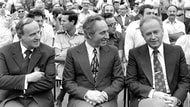
Yitzhak Rabi (left) and Shimon Peres (center)
Shalhevet Freier, the director-general of the Israel Atomic Energy Commission, was fired in 1976, and his replacement by Brig. Gen. Uzi Eilam was allegedly directly related to the preparations for the 1979 event—the implication being that the swap was due to Freier’s opposition to the test.
Freier himself used to talk rather openly about his firing, stressing that it was not about “personal or moral conduct” and hinting that it was about a major policy issue about which he disagreed with his superiors, in particular Peres.
Freier even suggested that his direct boss, Prime Minister Yitzhak Rabin, agreed with him on this classified policy issue, but for unrelated political reasons Rabin decided to defer to Peres and agreed to let Freier be fired.
A press leak from Israel
A CBS Evening News story about the Vela event on Feb. 21, 1980, was based on exclusive reporting from a young Tel Aviv-based American correspondent, Dan Raviv.
The report claimed that CBS had learned that the Vela event was indeed an Israeli nuclear test. Raviv filed his report from Rome in an effort to evade Israeli military censorship. As a result, Raviv lost his press credentials after a direct order from then-Defense Minister Ezer Weizman.
Decades later, Raviv said that he had an additional high-level and reliable Israeli political source who confirmed the Vela story. The late Eliyahu Speiser, a well-connected Israeli politician and member of the Knesset for the Labor Party between 1977 and 1988. Speiser was in those days close to Peres.
The MIT connection
Other documents disclose that Jack Ruina, the chairman of Carter’s controversial panel and a professor at the Massachusetts Institute of Technology, received anecdotal information from a “personal contact” at MIT relating to the “theory of Israeli involvement” in the Sept. 22 event.
The documents do not elaborate on what exactly that information was, but it is noted that Ruina considered it “significant but inappropriate for discussion on telephone”.
According to Seymour Hersh’s The Samson Option (published in 1991), Ruina’s source was an unnamed Israeli missile expert, who in 1980 to 1981 was a visiting fellow at MIT in a program that Ruina directed.
That missile engineer was Yaron Anselm, as MIT records from that period indicate. Anselm was one of the founders of Israel’s weapons development authority, known as Rafael.
Shalhevet Freier, the director-general of the Israel Atomic Energy Commission, was fired in 1976, and his replacement by Brig. Gen. Uzi Eilam was allegedly directly related to the preparations for the 1979 event—the implication being that the swap was due to Freier’s opposition to the test.
Freier himself used to talk rather openly about his firing, stressing that it was not about “personal or moral conduct” and hinting that it was about a major policy issue about which he disagreed with his superiors, in particular Peres.
Freier even suggested that his direct boss, Prime Minister Yitzhak Rabin, agreed with him on this classified policy issue, but for unrelated political reasons Rabin decided to defer to Peres and agreed to let Freier be fired.
A press leak from Israel
A CBS Evening News story about the Vela event on Feb. 21, 1980, was based on exclusive reporting from a young Tel Aviv-based American correspondent, Dan Raviv.
The report claimed that CBS had learned that the Vela event was indeed an Israeli nuclear test. Raviv filed his report from Rome in an effort to evade Israeli military censorship. As a result, Raviv lost his press credentials after a direct order from then-Defense Minister Ezer Weizman.
Decades later, Raviv said that he had an additional high-level and reliable Israeli political source who confirmed the Vela story. The late Eliyahu Speiser, a well-connected Israeli politician and member of the Knesset for the Labor Party between 1977 and 1988. Speiser was in those days close to Peres.
The MIT connection
Other documents disclose that Jack Ruina, the chairman of Carter’s controversial panel and a professor at the Massachusetts Institute of Technology, received anecdotal information from a “personal contact” at MIT relating to the “theory of Israeli involvement” in the Sept. 22 event.
The documents do not elaborate on what exactly that information was, but it is noted that Ruina considered it “significant but inappropriate for discussion on telephone”.
According to Seymour Hersh’s The Samson Option (published in 1991), Ruina’s source was an unnamed Israeli missile expert, who in 1980 to 1981 was a visiting fellow at MIT in a program that Ruina directed.
That missile engineer was Yaron Anselm, as MIT records from that period indicate. Anselm was one of the founders of Israel’s weapons development authority, known as Rafael.

On the eve of the Labour Party’s 2019 annual conference, the venue was illuminated by projections of a Palestine flag, alongside the slogans “Free Palestine,” “Solidarity with Palestine” and “Freedom, justice and equality”, as part of a creative stunt by Palestine Solidarity Campaign (PSC).
A motion expressing support for the people of Palestine, including a commitment to upholding international law, in relation to the UK’s trade with Israel, and to oppose Trump’s “Deal of the Century,” is featured in the conference ballot, and PSC is encouraging delegates to prioritise and vote for the motion.
PNN further reports that the creative stunt comes one year on from a display of solidarity, at the 2018 annual conference which saw the hall filled with a sea of Palestinian flags as a motion in support of Palestinian rights was passed resoundingly.
Campaigners are seeking to ensure that Palestine stays on the agenda of conference floor, this year.
A motion expressing support for the people of Palestine, including a commitment to upholding international law, in relation to the UK’s trade with Israel, and to oppose Trump’s “Deal of the Century,” is featured in the conference ballot, and PSC is encouraging delegates to prioritise and vote for the motion.
PNN further reports that the creative stunt comes one year on from a display of solidarity, at the 2018 annual conference which saw the hall filled with a sea of Palestinian flags as a motion in support of Palestinian rights was passed resoundingly.
Campaigners are seeking to ensure that Palestine stays on the agenda of conference floor, this year.
16 sept 2019
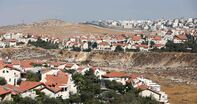
The Israeli government on Sunday approved its proposal to legalize an outpost in the Jordan Valley two days before the Knesset election after its attorney general agreed to retract his opposition.
However, the final approval for legalizing the outpost will be made by the next government.
"The government will decide on kick-starting the process of establishing the settlement of Mevo'ot Yeriho in the Jordan Valley," said Israeli premier Benjamin Netanyahu at the cabinet meeting, which was held in the illegal outpost.
"The final approval will of course be given upon the formation of the new government," he said.
During the meeting, Netanyahu said that he had been informed during the past 24 hours that there is high probability that the US administration's Middle East peace plan would be released immediately after Tuesday's election, and therefore the decision to approve the establishment of the outpost was significant.
In response, the government’s attorney general, Avichai Mendelblit, who at first opposed the decision, said he had changed his opinion after being made privy to this "new information."
A few days ago, Netanyahu announced during a news conference that US president Donald Trump's peace plan is expected to be released several days after the election and said he intended to annex the Jordan Valley and the Dead Sea if he won the election.
Last week, Netanyahu also announced he intends to approve Mevo'ot Yeriho's legalization. He was later informed by Mendelblit this could not be done with a transitional government.
In his official legal opinion, published Thursday, Mendelblit said there is no urgency to approve the outpost two days before the election, and therefore a transitional government does not have the authority to make such a decision.
Mendelblit added that the timing of the decision "raises concerns that the proposal stems from, or at least appears to stem from, considerations of the upcoming election."
However, the final approval for legalizing the outpost will be made by the next government.
"The government will decide on kick-starting the process of establishing the settlement of Mevo'ot Yeriho in the Jordan Valley," said Israeli premier Benjamin Netanyahu at the cabinet meeting, which was held in the illegal outpost.
"The final approval will of course be given upon the formation of the new government," he said.
During the meeting, Netanyahu said that he had been informed during the past 24 hours that there is high probability that the US administration's Middle East peace plan would be released immediately after Tuesday's election, and therefore the decision to approve the establishment of the outpost was significant.
In response, the government’s attorney general, Avichai Mendelblit, who at first opposed the decision, said he had changed his opinion after being made privy to this "new information."
A few days ago, Netanyahu announced during a news conference that US president Donald Trump's peace plan is expected to be released several days after the election and said he intended to annex the Jordan Valley and the Dead Sea if he won the election.
Last week, Netanyahu also announced he intends to approve Mevo'ot Yeriho's legalization. He was later informed by Mendelblit this could not be done with a transitional government.
In his official legal opinion, published Thursday, Mendelblit said there is no urgency to approve the outpost two days before the election, and therefore a transitional government does not have the authority to make such a decision.
Mendelblit added that the timing of the decision "raises concerns that the proposal stems from, or at least appears to stem from, considerations of the upcoming election."
15 sept 2019
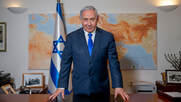
In an exclusive interview with Ynet, Netanyahu says those who claim the potential U.S.-Israel defense treaty wouldn't be financially viable 'don't know what they're taking about'; adds he'd sit with Arab ministers in his government as long as they're not Ahmad Tibi or Ayman Odeh
Prime Minister Benjamin Netanyahu says he won't rule out Arab ministers being part of his government and dismisses accusations by political rivals that a potential defense treaty with the U.S. is nothing more than an election stunt.
Netanyahu sat down for an exclusive interview with Ynet at the prime minister's official residence in Jerusalem on Saturday night, as politicians began their final push before the Tuesday elections.
The prime minister said Blue and White leader Benny Gantz “doesn’t know what he’s talking about” when he says that a U.S.-Israel defense treaty would “tie Israel’s hands.”
President Donald Trump on Saturday said he spoke with Netanyahu about the possibility of a defense treaty between the two countries. The announcement drew criticism from some in the defense establishment, who claimed the cost of such agreement would far outweigh its benefits.
“The implications (of such treaty) would be immense, it would tremendously strengthen Israel’s security and deterrence - a defense treaty with the world’s biggest power,” he said. “I’ve been working on it for the past eight months and we’ve agreed to continue discussing it.”
Prime Minister Benjamin Netanyahu says he won't rule out Arab ministers being part of his government and dismisses accusations by political rivals that a potential defense treaty with the U.S. is nothing more than an election stunt.
Netanyahu sat down for an exclusive interview with Ynet at the prime minister's official residence in Jerusalem on Saturday night, as politicians began their final push before the Tuesday elections.
The prime minister said Blue and White leader Benny Gantz “doesn’t know what he’s talking about” when he says that a U.S.-Israel defense treaty would “tie Israel’s hands.”
President Donald Trump on Saturday said he spoke with Netanyahu about the possibility of a defense treaty between the two countries. The announcement drew criticism from some in the defense establishment, who claimed the cost of such agreement would far outweigh its benefits.
“The implications (of such treaty) would be immense, it would tremendously strengthen Israel’s security and deterrence - a defense treaty with the world’s biggest power,” he said. “I’ve been working on it for the past eight months and we’ve agreed to continue discussing it.”
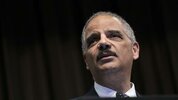
Former US Attorney General Eric Holder
Former US Attorney General Eric Holder has said that the country’s President Donald Trump can be subjected to prosecution after his presidential tenure ends.
Responding to a question on whether Trump could be prosecuted, the Obama administration’s top judicial official said during a Saturday interview with CNN that "I don’t think there’s any question about that."
Holder was being interviewed by former Obama adviser David Axelrod, who asked him: “If there is no impeachment, do you believe that [Trump] is subject to prosecution after he leaves office?"
"We already have an indictment in the Southern District of New York," Holder further asserted, referencing former Trump lawyer Michael Cohen’s guilty plea to campaign finance violations.
"Individual-1 is the president, and it would seem to me that the next attorney general, the next president, is going to have to make a determination," he then emphasized.
Cohen is in prison for campaign finance violations stemming from hush money payments. He testified before Congress last February that Trump directed him to make the payments.
Justice Department guidance states, however, that a sitting president cannot be indicted.
The development came a day after the US House Judiciary Committee Chairman Jerrold Nadler of New York revealed that an "impeachment inquiry" has already begun against Trump.
Speaking with CNN’s Chris Cuomo on Friday, Nadler further discussed the role of his committee, which has taken the lead in investigating potential charges against Trump that were raised in the Mueller report.
Highlighting on the legal term “impeachment inquiry,” Cuomo asked Nadler specifically whether that "was what his team was doing right now?”
“It is not necessarily called an impeachment inquiry ... It is, however, what we are doing,” Nadler replied.
“We have been very clear the last several months. We are conducting an investigation with the purpose, among other things, of determining whether to report Articles of Impeachment to the entire House.
That’s exactly what we are doing. Whether you want to call it an impeachment investigation, impeachment inquiry, I am not interested in the nomenclature.”
Earlier press reports indicated that the committee was exploring new strategies and establishing the grounds to probe Trump on charge of obstruction of justice, allegations of campaign finance violations, witness tampering and unlawful self-enrichment through his business ventures.
Former US Attorney General Eric Holder has said that the country’s President Donald Trump can be subjected to prosecution after his presidential tenure ends.
Responding to a question on whether Trump could be prosecuted, the Obama administration’s top judicial official said during a Saturday interview with CNN that "I don’t think there’s any question about that."
Holder was being interviewed by former Obama adviser David Axelrod, who asked him: “If there is no impeachment, do you believe that [Trump] is subject to prosecution after he leaves office?"
"We already have an indictment in the Southern District of New York," Holder further asserted, referencing former Trump lawyer Michael Cohen’s guilty plea to campaign finance violations.
"Individual-1 is the president, and it would seem to me that the next attorney general, the next president, is going to have to make a determination," he then emphasized.
Cohen is in prison for campaign finance violations stemming from hush money payments. He testified before Congress last February that Trump directed him to make the payments.
Justice Department guidance states, however, that a sitting president cannot be indicted.
The development came a day after the US House Judiciary Committee Chairman Jerrold Nadler of New York revealed that an "impeachment inquiry" has already begun against Trump.
Speaking with CNN’s Chris Cuomo on Friday, Nadler further discussed the role of his committee, which has taken the lead in investigating potential charges against Trump that were raised in the Mueller report.
Highlighting on the legal term “impeachment inquiry,” Cuomo asked Nadler specifically whether that "was what his team was doing right now?”
“It is not necessarily called an impeachment inquiry ... It is, however, what we are doing,” Nadler replied.
“We have been very clear the last several months. We are conducting an investigation with the purpose, among other things, of determining whether to report Articles of Impeachment to the entire House.
That’s exactly what we are doing. Whether you want to call it an impeachment investigation, impeachment inquiry, I am not interested in the nomenclature.”
Earlier press reports indicated that the committee was exploring new strategies and establishing the grounds to probe Trump on charge of obstruction of justice, allegations of campaign finance violations, witness tampering and unlawful self-enrichment through his business ventures.
14 sept 2019
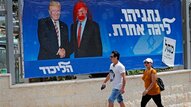
A couple walks past a defaced election billboard for the Likud party showing US President Donald Trump (L) shaking hands with Likud chairman and Prime Minister Benjamin Netanyahu in Jerusalem al-Quds on September 14, 2019
US President Donald Trump is trying to “further anchor” the alliance between Washington and Tel Aviv as Israeli Prime Minister Benjamin Netanyahu struggles to remain in power.
On Saturday, Trump said on Twitter that he had spoken with the Israeli premier about “a Mutual Defense Treaty” with the Zionist regime.
“I had a call today with Prime Minister Netanyahu to discuss the possibility of moving forward with a Mutual Defense Treaty, between the United States and Israel, that would further anchor the tremendous alliance between our two countries,” said the US president.
Trump further voiced willingness to meet Netanyahu on the sidelines of the upcoming United Nations General Assembly session in New York.
In response, the hawkish prime minister thanked Trump, asserting that Israel “has never had a greater friend in the White House.”
“I look forward to our meeting at the UN to advance a historic Defense Treaty between the United States and Israel,” he added.
The two have floated the idea of a so-called defense treaty days before Israelis are heading to the polls.
Trump has previously voiced support for Netanyahu to stay in power and the tweet appears to be a last-minute attempt to boost his image by citing their close alliance before the Tuesday elections.
Netanyahu is facing corruption charges, which play a key role in the campaigning of his opponent, former Israeli armed forces chief Benny Gantz.
US President Donald Trump is trying to “further anchor” the alliance between Washington and Tel Aviv as Israeli Prime Minister Benjamin Netanyahu struggles to remain in power.
On Saturday, Trump said on Twitter that he had spoken with the Israeli premier about “a Mutual Defense Treaty” with the Zionist regime.
“I had a call today with Prime Minister Netanyahu to discuss the possibility of moving forward with a Mutual Defense Treaty, between the United States and Israel, that would further anchor the tremendous alliance between our two countries,” said the US president.
Trump further voiced willingness to meet Netanyahu on the sidelines of the upcoming United Nations General Assembly session in New York.
In response, the hawkish prime minister thanked Trump, asserting that Israel “has never had a greater friend in the White House.”
“I look forward to our meeting at the UN to advance a historic Defense Treaty between the United States and Israel,” he added.
The two have floated the idea of a so-called defense treaty days before Israelis are heading to the polls.
Trump has previously voiced support for Netanyahu to stay in power and the tweet appears to be a last-minute attempt to boost his image by citing their close alliance before the Tuesday elections.
Netanyahu is facing corruption charges, which play a key role in the campaigning of his opponent, former Israeli armed forces chief Benny Gantz.
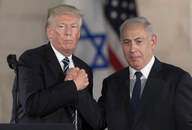
Campaigning group Palestine Solidarity Campaign (PSC) has condemned Israeli Prime Minister Benjamin Netanyahu’s vow to annex large parts of the occupied West Bank, and has called on the UK Government to hold Israel to account for its ongoing violations of international law.
The comments were made just a week before fresh elections take place in Israel, as Netanyahu cited “maximum coordination with Trump” as a key factor in the move towards annexation.
This proposed move follows a series of acts by the Netanyahu government that has attacked the collective rights of the Palestinian people; whether those living under military occupation or as citizens of the state of Israel.
Earlier this year, when Netanyahu ran for re-election and subsequently failed to form a government in the Knesset, he publicly reasserted his belief that that Israel “is not a state of all its citizens.”
While Palestinian citizens of Israel are allowed to vote in the upcoming elections, the “Nation State Law” passed in 2018 in Israel enshrines discrimination against them into the constitution.
Since 1948, Israel has passed over 60 laws which discriminate against Palestinian citizens of Israel in housing, welfare provision, education, public works and building permission.
The move to annex large parts of the occupied West Bank seeks to entrench the de facto sovereignty Israel is exercising over the 2.8 million Palestinians who live in the West Bank under Israeli military control which denies them basic human rights.
None of these Palestinians have voting rights in the Israeli elections; nor do the millions of Palestinians refugees who have been forcibly expelled from their homes since 1948.
Campaigners say this pledge is yet more evidence that Benjamin Netanyahu will continue to violate international law without fear of consequences, and that the global community has an obligation to hold Israel to account for these crimes.
They also stress that this proposed annexation will remove the possibility of a viable Palestinian state, leaving any potential state having no border with any other state than Israel.
PSC has reaffirmed its call for fundamental change in Israel, stressing that all candidates for Prime Minister in the upcoming elections have demonstrated commitment to ongoing military occupation and apartheid.
Ben Jamal, Director of Palestine Solidarity Campaign, said: “This pledge is not only a stark reminder of the Israeli government’s staunch commitment to stripping Palestinians of their rights and their homeland, but it also highlights that the fundamental issues with the Israeli state run far deeper than one politician or government.
Netanyahu is making this pledge because he is confident that it will win him votes at next week’s elections. There is no meaningful pressure for change coming from within Israel, and so pressure needs to be exerted externally.
It is incumbent upon the UK government, which continues to repeat the mantra of its support for a two-state solution, to accept the reality that these steps remove the possibility of a Palestinian state. Actions, and not words are required.
– PSC reaffirms its call for an immediate ban on the import of settlement goods and an end to the arms trade with Israel, and calls upon UK civil society to continue applying pressure on all companies complicit in Israel’s human rights abuses.”
Source : Palestine News Network
The comments were made just a week before fresh elections take place in Israel, as Netanyahu cited “maximum coordination with Trump” as a key factor in the move towards annexation.
This proposed move follows a series of acts by the Netanyahu government that has attacked the collective rights of the Palestinian people; whether those living under military occupation or as citizens of the state of Israel.
Earlier this year, when Netanyahu ran for re-election and subsequently failed to form a government in the Knesset, he publicly reasserted his belief that that Israel “is not a state of all its citizens.”
While Palestinian citizens of Israel are allowed to vote in the upcoming elections, the “Nation State Law” passed in 2018 in Israel enshrines discrimination against them into the constitution.
Since 1948, Israel has passed over 60 laws which discriminate against Palestinian citizens of Israel in housing, welfare provision, education, public works and building permission.
The move to annex large parts of the occupied West Bank seeks to entrench the de facto sovereignty Israel is exercising over the 2.8 million Palestinians who live in the West Bank under Israeli military control which denies them basic human rights.
None of these Palestinians have voting rights in the Israeli elections; nor do the millions of Palestinians refugees who have been forcibly expelled from their homes since 1948.
Campaigners say this pledge is yet more evidence that Benjamin Netanyahu will continue to violate international law without fear of consequences, and that the global community has an obligation to hold Israel to account for these crimes.
They also stress that this proposed annexation will remove the possibility of a viable Palestinian state, leaving any potential state having no border with any other state than Israel.
PSC has reaffirmed its call for fundamental change in Israel, stressing that all candidates for Prime Minister in the upcoming elections have demonstrated commitment to ongoing military occupation and apartheid.
Ben Jamal, Director of Palestine Solidarity Campaign, said: “This pledge is not only a stark reminder of the Israeli government’s staunch commitment to stripping Palestinians of their rights and their homeland, but it also highlights that the fundamental issues with the Israeli state run far deeper than one politician or government.
Netanyahu is making this pledge because he is confident that it will win him votes at next week’s elections. There is no meaningful pressure for change coming from within Israel, and so pressure needs to be exerted externally.
It is incumbent upon the UK government, which continues to repeat the mantra of its support for a two-state solution, to accept the reality that these steps remove the possibility of a Palestinian state. Actions, and not words are required.
– PSC reaffirms its call for an immediate ban on the import of settlement goods and an end to the arms trade with Israel, and calls upon UK civil society to continue applying pressure on all companies complicit in Israel’s human rights abuses.”
Source : Palestine News Network
13 sept 2019
|
|
An anti-war activist says Israel has been spying in the US not only against its government, but any individual critical of the occupying regime.
Richard Becker, a regional coordinator for the ANSWER Coalition protest umbrella group, consisting of many antiwar and civil rights organizations, made the remarks on Press TV’s The Debate show on Thursday. “There is the spying not only on the US government, but there are clandestine intelligence operations being carried out against anyone in the United States, who is critical” of Israel, he said. In contrast to other instances of foreign spying, however, President Donald Trump’s administration has not rebuked Israel, and there were no |
consequences for the regime’s behavior, Politico reported on Thursday, citing three former senior US officials with knowledge of the matter.
Becker also explained that “the White House, and the FBI and the other agencies are being told to keep their mouth shut about this,” because it could cause problems ahead of Israeli elections next week.
“The Trump administration wants [Benjamin] Netanyahu back as Prime Minister again,” he added.
He further pointed out that the reason Israel is so interested in carrying out such wide-ranging intelligence gathering in the US is that the regime is very isolated in the world, while its protector is the United States.
Becker also explained that “the White House, and the FBI and the other agencies are being told to keep their mouth shut about this,” because it could cause problems ahead of Israeli elections next week.
“The Trump administration wants [Benjamin] Netanyahu back as Prime Minister again,” he added.
He further pointed out that the reason Israel is so interested in carrying out such wide-ranging intelligence gathering in the US is that the regime is very isolated in the world, while its protector is the United States.
Page: 40 - 39 - 38 - 37 - 36 - 35 - 34 - 33 - 32 - 31 - 30 - 29 - 28 - 27 - 26 - 25 - 24 - 23 - 22 - 21 - 20 - 19
